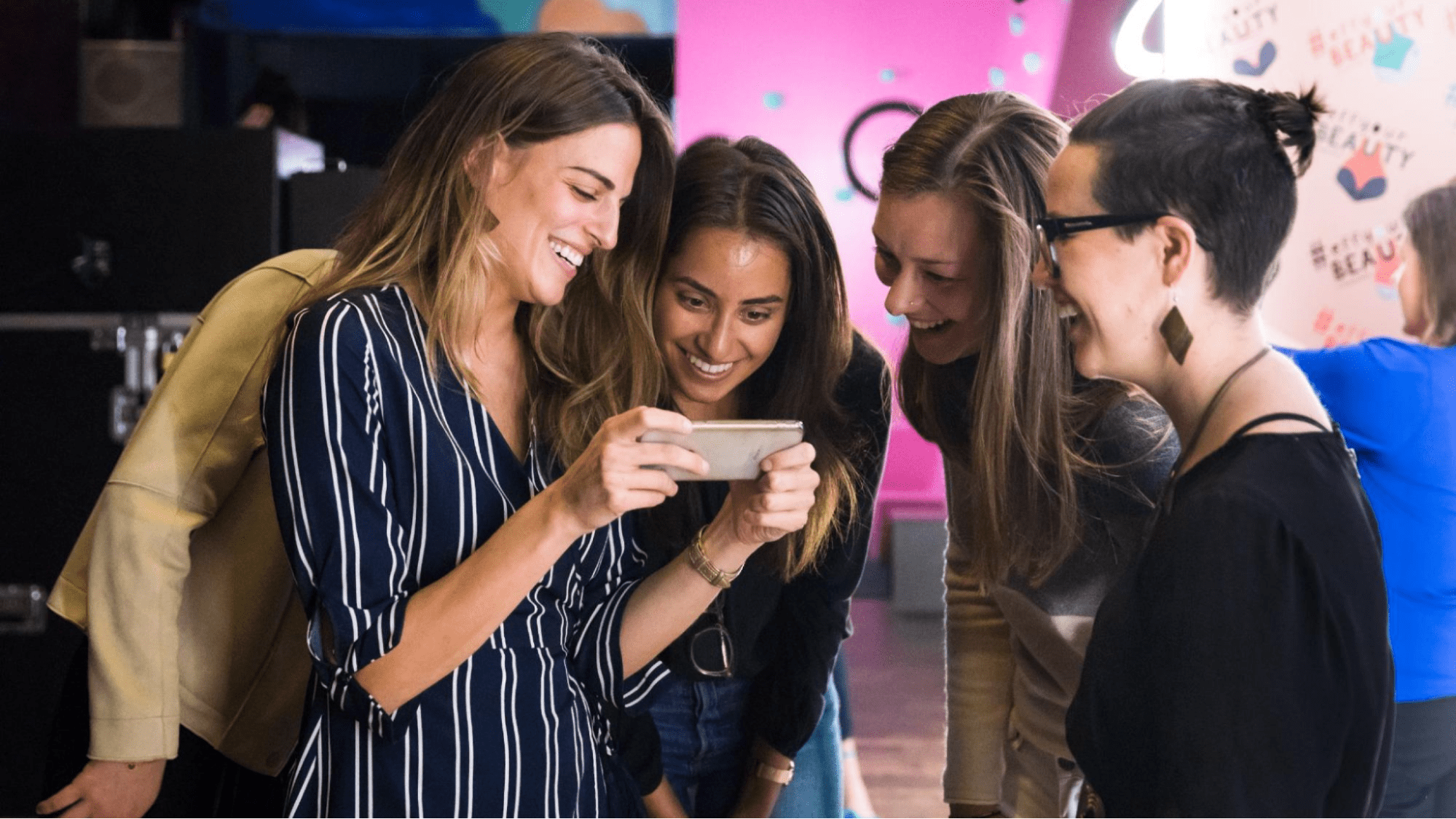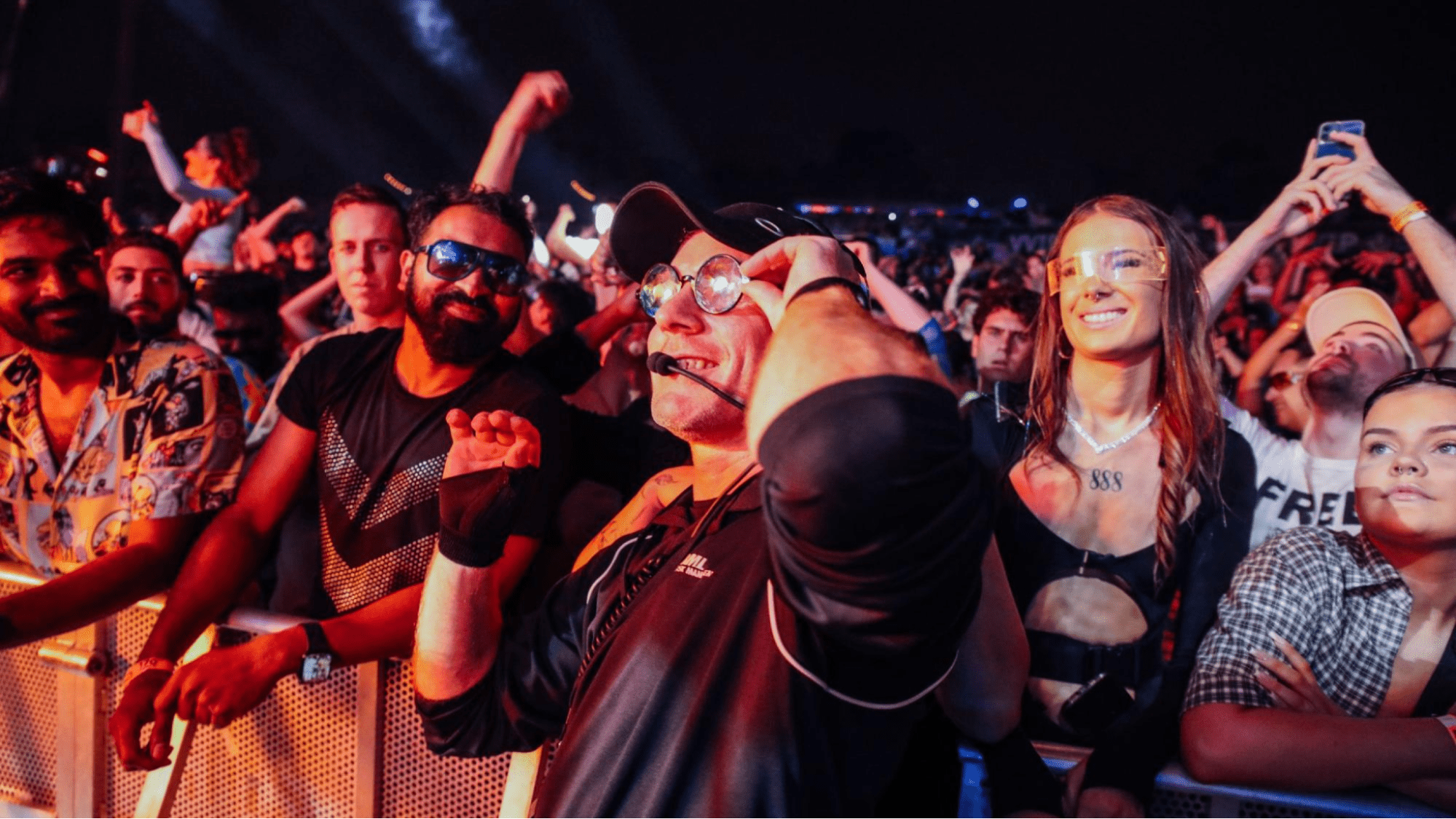The value of events is criminally underrated.
You see, events are not just entertainment; they’re powerful transformative experiences that can turn a night out into a cultural revolution.
They can even convince your most antisocial friend to leave the house!
But let’s not forget that your business also benefits from creating events — through lead generation.
At Eventbrite, we’ve partnered with global event creators for years to increase attendance and ticket sales. In just one year, we generated 30% of all paid tickets from our network.
Ready to get in on the action? Here, we’ll show you the tips and tricks for event lead generation and explain how you can use events to build a community of devoted fans to increase your loyal customer base.

Why are events such a powerful tool for lead generation?
The most effective way to build strong relationships with your attendees is to use the value-first marketing model, which allows you to start ‘selling without selling.’ This marketing model focuses on providing potential leads with tangible value, which can be more effective than a ‘hard sale.’

Your aim is to generate leads by highlighting your unique value proposition and promoting the unique emotional experience that attendees feel at your events.
In doing so, you establish trust and credibility early on, making converting warm traffic into hot traffic easier.
Events are a powerful tool for lead generation, as they:
- Give attendees real and tangible value
- Create a memorable and personal experience to strengthen brand awareness and shareability
- Provide a space for networking opportunities
- Offer event creators the chance to humanize their brand through face-to-face interaction
Take Matunuck Oyster Bar, for example. This restaurant regularly hosts 60-minute farm tours showing their oyster farm and the process of oyster farming. These tours educate attendees and provide an opportunity to showcase the restaurant’s brand personality, helping to foster a deep emotional connection with their audience through shared values.
This approach increases brand loyalty and advocacy and builds relationships with visitors rather than just transactional engagement.
As a creator, you have many lead-generation tactics at your fingertips, which you can tailor to suit your unique needs and goals.
For example, you can:
- Host free or low-cost events as a promotional tool for an upcoming event, such as a fundraiser run or workshop
- Use live footage from past events, such as live music shows or food festivals, as a social media marketing strategy to attract new leads through ‘fear of missing out’ (FOMO)
- Use email marketing techniques to retarget past attendees and nurture them into becoming recurring ticket buyers
- Host events to showcase the atmosphere of your venue, such as a bar or restaurant, to encourage future attendance
Events are a powerful lead generation tool that has a high return on investment (ROI) and establish a connection with your attendees, so you can increase the chance of building a loyal community.

How to set up your event lead generation campaign for success
A common mistake that event creators make is assuming that lead generation is a one-step process. Event lead generation involves a three-step strategy: demand generation, lead generation, and lead nurturing.
1. Pre-event: demand generation
Demand generation is all about making people aware of your event brand. Social media and website marketing typically achieve this.
The main focus of your lead generation campaign is to provide your audience with valuable and free content that aligns with your brand personality. For example, you could create playlists from previous music events and release them on Spotify or SoundCloud.
Additional strategies include:
- Providing social proof through user-generated content (UGC), such as tagged photos and videos from past attendees or highlighting positive comments on your social media page.
- Creating a podcast that offers entertaining content for free. For example, for a live music venue, you could create a bi-weekly podcast where you interview local musicians about their upcoming shows.
- Sending out a weekly email newsletter sharing short, exciting information relating to your event or the industry. For instance, a conference organizer could talk about ‘women in business’ or share a ‘women champion of the week’ newsletter highlighting tangible advice and links to their website.
- Producing creative promotional videos of past events to transmit the atmosphere and energy your events carry.
It’s crucial to understand that the connection an attendee has with your brand reflects their individual self-image.
For example, entertainment venue Victory North creates ‘grunge-punk’ Instagram videos. Their unique reels make past and potential attendees who identify with their tribe more likely to share the content.
💡Pro tip: Repurpose your content for multiple platforms to maximize its reach and effectiveness. For example, use an AI tool like InVideo to cut videos into snippets you can share on social media.
2. During the event: lead generation
Once you’ve captured your audience’s attention, your main goal is to convert them into regular attendees.
Think about the reasons your prospects wanted to attend your event in the first place. For example, they want to walk away feeling like they have more value.
This is your chance to establish yourself as a standout event creator; getting this right will make it easier to sell registrations in the long run.
For example, Macoletta, a New York pizzeria, hosts small group pizza-making classes regularly. Participants learn how to make pizza and experience the freshness of Macoletta’s ingredients first-hand.
Macoletta is able to use live events to establish personal connections while highlighting the authentic charm of their venue.
As a result of Macoletta’s guests’ positive experiences, the venue’s reputation grows, and attendees are more likely to recommend them to friends and family. A recommendation from someone you trust is worth its value in gold. Increasing word-of-mouth marketing hugely increases your chance of generating new event leads.
The same applies to event organizers using events to generate leads for a product or service. For instance, GrowthHackers hosted an eight-hour conference featuring industry leaders offering advice on how to scale a business.
It’s also important to measure your event’s success by using the following tracking metrics:
- The number of tickets sold before the event or on the door
- How many attendees left feedback through post-event surveys, social media, or Google reviews
- Engagement with your post-event email campaign, such as an open-rates and event registrations
With Eventbrite, you can track real-time event data from start to finish, from social media engagement to attendee check-ins to the effectiveness of your post-event email marketing campaign.
Track your event’s online metrics with Eventbrite.

💡Pro tip: Ensure you take high-quality photos and videos during the event that you can use online afterward. Consider hiring a professional photographer who can capture genuine reactions to your events’ atmosphere.

3. Post-event: nurturing leads to conversions
Your post-event follow-up helps to keep your brand primal and nurture leads into ticket sales.
Remember: Prompt follow-up is key to delivering a successful ROI from your event. If you leave communication too long, attendees will likely forget about your brand or lose interest.
The main objective of your post-event campaign is to convert first-time or occasional attendees into loyal customers who keep returning. Maintaining regular communication and building relationships with attendees can foster loyalty and turn them into repeat customers.
You can nurture leads by the following:
- Tagging attendees in event photos to boost your online presence and visibility with attendees and their followers who may share the same interests and values as them.
- Gathering feedback and insights from attendees by using post-event survey forms demonstrates that you value their opinions and experiences.
- Offering exclusive perks and incentives. For example, you could offer a 20% discount on a future event ticket or a referral discount if they bring two or more friends to your next event.
However, one of the most effective ways to capture your leads’ attention is by crafting a personalized email campaign. Personalization increases the perceived personal relevance of your advertising, reducing its intrusiveness and making it appear more genuine and engaging.
Sprinkling in personal touches can go a long way in building a lasting relationship. Therefore, your email must come across as though you wrote it to each attendee and didn’t send it out in bulk to everyone who attended.
To boost personalization, you can try:
- Using the attendee’s first name
- Attaching a folder of event photos
Effective post-event follow-up is an ongoing but essential process. To streamline your campaign, use Eventbrite’s custom email templates that allow you to tailor your message and use artificial intelligence to optimize your follow-up emails.
Eventbrite also allows you to increase the impact of your ‘lead nurture email campaign’ by leveraging past email performance data to learn what resonates with your audience — resulting in a 59% higher open rate.
💡Pro tip: Use nostalgia as a marketing tactic to convert one-time ticket sales into loyal community members. For example, post ‘throwback Thursday’ photos or videos on social media so past attendees never forget the experience and want to keep reliving it.

Event marketing strategies that’ll help generate leads
Now that you have a solid understanding of how to approach event lead generation, let’s dive into some additional marketing strategies that you can use to help generate leads, attract the right attendees to your events, and convert them into loyal customers.
Create a strong hook for your event
You want to create excitement pre-event to attract the right attendees and turn leads into loyal community members.
An effective way to find out what your audience is looking for is by using data insights from past events. Event management platforms, such as Eventbrite, offer data insight reports to help you understand what events received the highest attendance and engagement rates.
You can then use this to generate ideas that will resonate with new groups of people. For example, if the data shows that your most popular event involves costumes, you could throw a costume party event to attract new attendees.
It’s all about getting attention, so don’t be afraid to think outside the box.
For example, Stay Silent promoted their music event by attending the Fade Show vintage clothing market and interviewing attendees about their clothes purchases.
This guerilla marketing technique reinforced that they’re an ‘edgy and provocative’ brand and helped them target new leads with similar values and interests to their existing community.
Understand the demographics of your target audience
Before you begin event planning, identify who should attend. Like other forms of lead generation, your efforts will be worth the investment if your event attracts people who’ll likely become customers.
Build out your ideal attendee persona. Where do they live? What do they do for a living? Where do they hang out online?
Spend time defining your target audience using templates and workbooks to help you determine who you’re trying to attract.
A firm understanding of your target audience helps you promote your event more efficiently. But, more importantly, this step helps define your event’s value proposition.
Why should your target audience attend your event? Audit your marketing materials to make sure they appeal to the specific buyer you want.
Utilize your registration process to collect attendee information
There are two things to consider when creating the registration process.
First of all, the experience must make it easy to sign up. Long page loading times or pages not built for phones can cause you to lose qualified customers.
Secondly, it’s crucial to use the registration process to collect the right information.
Eventbrite allows you to customize the information you ask and collect from attendees during checkout. You can choose what information attendees need to answer and use this data later to appeal to your target leads in your post-event email campaign.
Increase the ROI of your event marketing strategy
Events are a magnet for like-minded individuals.
Therefore, by providing a unique experience, you can turn potential leads and attendees into loyal community members.
By leveraging the event lead generation strategies mentioned above and approaching your event marketing with your target audience in mind, you can increase brand awareness and, ultimately, drive more conversions.
With Eventbrite, you can tailor your event lead generation campaign to reach your specific target audience and maximize results. Our data and analytics reports and marketing tools can help you understand attendee behavior, track ROI, and get the word out about your brand.






